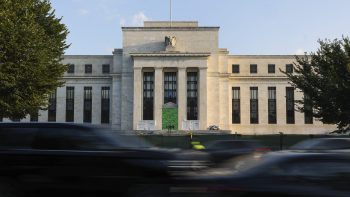A $1.8 billion profit at AIG. A $1.7 billion loss at Royal Bank of Scotland. The White House backs off the Fan and Fred “bad bank” idea. More job losses, but not enough to break the 10 percent “threshold”. And Ben Stein gets the boot from the Times.
AIG scores
The insurer racks up its first profit since its near-collapse last year. $1.8 billion is a nice round number, exactly one percent of the $180 billion that the taxpayer pumped into the company to keep it afloat. AIG was brought low by its credit default swap exposure, but the insurance parts of its business are still functioning.
RBS stumbles
A $1.7 billion loss for the British bank. RBS said it set aside £7.52 billion ($12.6 billion) to deal with bad loans in the first half.
RBS has split itself into ” core” and “non-core” divisions to distinguish between the businesses and assets that will be run down and sold and those that will remain central to the bank. The core division posted an operating profit of £6.3bn on revenues up 25pc to £17.8bn. Bad debts rose 225pc to £2.18bn.
CARS talk
The word came through late yesterday that the Senate is filling the Cash for Clunkers gas tank with another $2 billion of fuel. The WSJ reports consumers who missed the first round of the program could have fewer choices and potentially pay more unless auto makers accelerate production. There aren’t many Priuses up for grabs, thanks to a battery shortage, and reports say the Ford Focus is in short supply as well. For a while there, the Focus was top of the list of vehicles bought by participants in the program, but USAToday reports the Toyota Corolla is now the number one favorite. The Ford Explorer 4wd, meanwhile, is the most popular clunker being driven onto the lot.
Flighty
I guess our friends on Capitol Hill figured while they’re throwing billions of dollars around Detroit and Toyota City, they may as well put a little aside for themselves. Congress plans to spend $550 million buying eight new jets. This after certain representatives hauled auto execs over the coals for flying in private jets to Washington DC to testify before Congress earlier this year. Worse still, the WSJ reports, the eight jets go well above what the Air Force had initially requested as part of its annual appropriations. The Kansas City Star quotes Missouri Democratic Sen. Claire McCaskill’s criticism of the House Appropriations Committee:
“This just makes no sense. Talk about the wrong message at the wrong time,” McCaskill said. “While American families are tightening their belts there is no way we should be buying extra executive jets. No wonder so many people think we don’t get it.”
McCaskill will get her chance to fight the good fight against superflous spending when the Senate returns in the fall. Hopefully she’ll see right through the HAC’s shenanigans, which is neatly exposed by the WSJ in its story.
Ellis Brachman, a spokesman for the House Appropriations Committee, said the changes were part of “Congress’s normal oversight responsibility” to make sure “the troops have everything they need.”
Ah, the troops. Of course. And what do the troops say?
Geoff Morrell, the Pentagon press secretary, said the Department of Defense didn’t request the additional planes and doesn’t need them. “We ask for what we need and only what we need,” he told reporters Wednesday. “We’ve always frowned upon earmarks and additives that are above and beyond what we ask for.”
I never thought I’d describe the DoD as a paragon of fiscal conservatism, thrift and selflessness, but it’s looking pretty good compared to the House today.
Not so toxic
Last year, bankers at Credit Suisse were presumed to be dismayed when they were told part of their pay would come from a steaming, stinking, $5 billion heap of toxic sludge. The rest of the world smirked and reveled in schadenfreude as the NYT reported CS bankers would have to eat their own cooking.
Well, CS has wiped the smirks off everyone’s faces with the news that the fund has returned 17 percent since January. That’s way better than equities, meaning that those pesky bankers have managed to outsmart us AGAIN!
How did they do it? Aaron Lucchetti reports the gains have come from the sale of a few assets, as well as repayment from some bonds. But he points out that employees who got the fund can’t cash out of the shares for at least five years.
For now, Credit Suisse may have been a beneficiary of good market timing. The fund assets, which include debt of a Japanese shopping center, a mining company and a U.S. supermarket chain, could still take a turn for the worse before employees are paid.
There’s a lot happening in the world. Through it all, Marketplace is here for you.
You rely on Marketplace to break down the world’s events and tell you how it affects you in a fact-based, approachable way. We rely on your financial support to keep making that possible.
Your donation today powers the independent journalism that you rely on. For just $5/month, you can help sustain Marketplace so we can keep reporting on the things that matter to you.


















